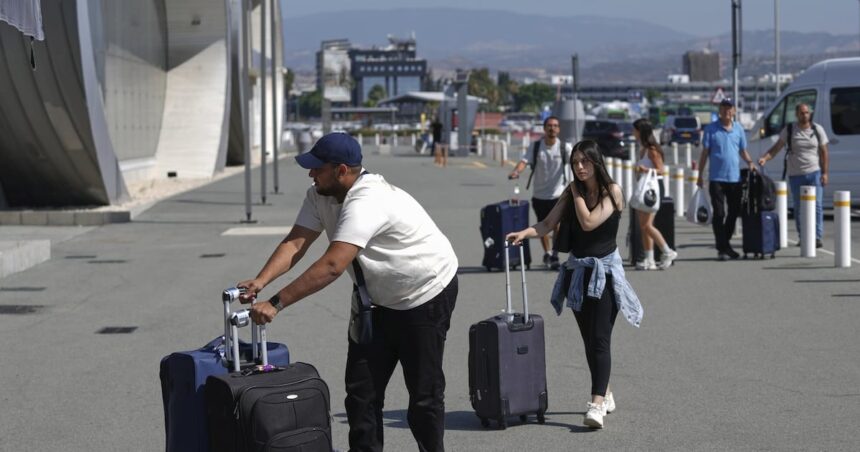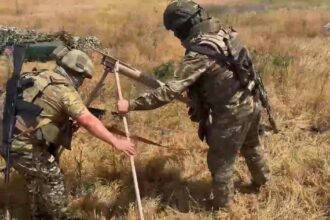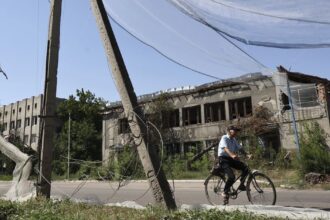The once-simmering tensions between Israel and Iran have erupted into what military analysts are now describing as the region’s most dangerous confrontation in decades, triggering a massive international evacuation effort across multiple countries in the Middle East.
As dawn broke over Beirut this morning, Canadian military transport planes joined a growing fleet of international aircraft evacuating foreign nationals, while naval vessels from several nations, including Britain and France, have positioned themselves along the Mediterranean coast to facilitate sea evacuations from multiple ports.
“We’re witnessing an unprecedented multinational extraction operation,” said General Marc Thornton, who is coordinating the Canadian evacuation response. “The scale and speed of deterioration has caught many by surprise, forcing diplomatic missions to activate emergency protocols simultaneously across several countries.”
The current crisis escalated dramatically after Israel’s targeted strike against Iran’s Natanz nuclear facility last week, which Tehran claimed killed 37 scientists and military personnel. Iran’s subsequent missile barrage targeting Tel Aviv marked the first direct military confrontation between the two adversaries after years of shadow warfare conducted through proxies.
Reports from CO24 World News correspondents indicate that over 8,700 foreign nationals have been evacuated in the past 72 hours alone, with priority given to the elderly, those requiring medical attention, and families with young children.
“We had approximately 15 minutes to gather essentials before the embassy vehicle arrived,” said Maria Gonzalez, a Spanish teacher working in Tehran who landed in Madrid yesterday. “The highways were congested with people attempting to leave the city, while air raid sirens continued intermittently.”
For Canadians in the region, the situation has become increasingly precarious. Foreign Affairs Minister Jonathan Reynolds confirmed that 412 Canadian citizens and permanent residents have been successfully evacuated from Iran, with operations continuing in Israel, Lebanon, and Syria.
“Our primary concern remains the safety of Canadians abroad,” Reynolds stated during an emergency press briefing covered by CO24 Canada News. “We urge all Canadians still in affected areas to register with the embassy immediately and prepare for potential evacuation.”
Financial markets have responded with predictable volatility. Oil prices surged 17% yesterday, reaching $142 per barrel—the highest level since 2022—as investors fear potential disruptions to shipping routes through the Strait of Hormuz, through which approximately 20% of global oil supply passes daily.
Economic analysts at CO24 Business report that the conflict has already triggered inflation concerns across European and North American markets, with consumer confidence indexes dropping sharply as uncertainty mounts.
Israel’s military has established a maritime security corridor in conjunction with U.S. naval forces to ensure evacuation vessels can safely navigate regional waters. Meanwhile, neighboring Jordan and Turkey have opened their airspace and borders to facilitate land evacuations from Syria and Lebanon.
“This isn’t just a bilateral conflict anymore,” noted Dr. Amira Hassan, Director of Middle Eastern Studies at the University of Toronto. “The involvement of Hezbollah in Lebanon, various militias in Syria, and potential activation of other Iranian proxies threatens to transform this into a regional war with global implications.”
As evacuations continue against the backdrop of escalating military actions, the international diplomatic community faces mounting pressure to broker a ceasefire. United Nations Secretary-General Paulo Sousa has called an emergency Security Council meeting for tomorrow, though expectations for meaningful intervention remain low given the council’s historical deadlock on Israeli-Iranian tensions.
The question now confronting world leaders extends beyond immediate evacuation logistics to the more troubling prospect: how do we prevent a regional conflict from expanding into a protracted war that could destabilize global security and economic systems for years to come?










